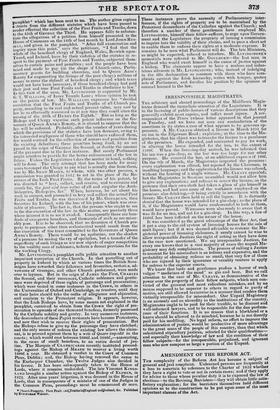IRRESPONSIBLE MAGISTRATES.
THE arbitrary and absurd proceedings of the Middlesex Magis- trates demand the immediate attention of the Legislature. It is in the licensing of public-houses of various descriptions that they generally exhibit most caprice, and inflict most injury. A cor- respondent of the Times (whose letter appeared in that journal on Tuesday, and we have not seen any contradiction of the assertions in it) states a case of what appears to be grievous op- pression. A Mr. CLEAVE obtained a licence in March 1834 for an inn in the Edgcware Road ; explaining at the time to the Ma- gistrates, that his object was to transfer the licence to a purchaser of the premises. He expended, and contracted to pay for work, in altering the house intended for the iim, to the extent of 1500/. When the licensing-day arrived, he was informed that his inn was a gin-shop, as the bar was too large for any other purpose. He removed the bar, at an additional expen.,e of 1001. On the 9th of March, the Magistrates inspected the premises : every explanation was offered, but rejected by the Chairman, in insulting language; and the application for the licence was refused, without the hearing of a single witness. Mr. CLEAVE appealed; but the Magistrates in Sessions assembled would not allow him to give any explanation ; and refused to renew the licence, on the pretence that their own clerk had taken a glass of gin himself in the house, and had seen some of the workmen employed on the premises also drinking,—it being strictly in accordance with the licence Mr. CLEAVE then held to sell the liquor. It is distinctly denied that the house was intended for a gin-shop ; as the plans of it, if the Magistrates would have condescended to look at them, would have proved. Witnesses were also ready to swear that it was fit for an inn, and not fur a gin-shop. In this way, a fine of 1600/. has been inflicted on the owner of the house.
It was considered as the great advantage of the Beer Act, that it put a stop to the old system of licensing houses for the sale of malt liquor; but if it was deemed advisable to restrain the Ma- gisterial power of licensing alehouses, it surely cannot be wise to allow irresponsible Justices the right of acting as they have done in the case now mentioned. We say irresponsible Justices, for every one knows that in a vast majority of cases the unpaid Ma- gistracy may defy complainants. The process of calling a Justice to account for his misconduct is so tedious and expensive, and the probability of obtaining redress so small, that very few of those who are injured by air ignorance or venality venture to apply for redress to the superior courts. We know that lords and gentlemen profess a horror of such vulgar "medicines of the mind" as gin and beer. But we call attention to the case of Mr. CLEAVE, as demonstrative of the power over the property of their fellow subjects, which men con- victed of the grossest and most ridiculous mistakes, and by no means supposed to be superior to others in regard to purity of
motive, are still allowed toexercise in a manner that renders them virtually irresponsible for misconduct. Our Unpaid Magistracy is an anomaly and an absurdity in the institutions of the country. Magistrates ought to be paid for their trouble, to be discreet and
well-informed lawyers, and to be responsible for the due perform- ance of their functions. It is no reason that a blockhead or a
knave should be allowed to do mischief, because he is not directly paid for his meddling. No legal reform, no effort to improve the administration of justice, would be productive of more advantage to the great mass of the people of this country, than that which substituted stipendiary justices, selected for their qualifications— and especially their knowledge of law and the condition of their fellow subjects—for the irresponsible, prejudiced, and ignorant men who now compose so large a portion of the Unpaid.


























 Previous page
Previous page